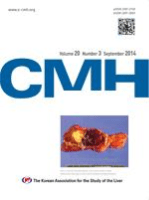
Clinical and Molecular Hepatology
Scope & Guideline
Pioneering insights in hepatology and molecular biology.
Introduction
Aims and Scopes
- Hepatitis B and C Virus Research:
A major focus on the molecular mechanisms, therapeutic strategies, and clinical outcomes related to hepatitis B and C infections, including studies on antiviral treatments, biomarkers, and patient management. - Hepatocellular Carcinoma (HCC) Insights:
Research dedicated to understanding the epidemiology, risk factors, prevention strategies, and treatment modalities for hepatocellular carcinoma, including surgical and non-surgical interventions. - Metabolic Dysfunction-Associated Liver Diseases:
Exploration of metabolic liver diseases, particularly the transition from non-alcoholic fatty liver disease (NAFLD) to metabolic dysfunction-associated steatotic liver disease (MASLD), and their clinical implications. - Liver Transplantation and Regenerative Medicine:
Studies focusing on advancement in liver transplantation techniques, donor-recipient matching, and the role of stem cells in liver regeneration and therapy. - Clinical Guidelines and Real-World Practices:
Dissemination of clinical practice guidelines and real-world evidence to improve management strategies and patient outcomes for liver diseases across diverse populations. - Emerging Technologies in Hepatology:
Incorporation of innovative methodologies such as machine learning and multi-omics approaches to enhance diagnostic accuracy and treatment efficacy in liver diseases.
Trending and Emerging
- Artificial Intelligence and Machine Learning Applications:
The integration of AI and machine learning in predicting treatment outcomes and disease progression is on the rise, showcasing the potential for technology to enhance clinical decision-making. - Multi-Omics Approaches:
Research employing multi-omics profiling is gaining momentum, offering insights into the complex biological underpinnings of liver diseases and paving the way for personalized treatment strategies. - Risk Stratification and Predictive Modeling:
An increasing emphasis on developing risk scores and predictive models to identify high-risk patients for liver diseases, particularly in hepatocellular carcinoma and metabolic disorders. - Patient-Centered Care in Liver Disease Management:
A growing focus on patient-centered approaches that consider the individual needs and experiences of patients in the management of liver diseases, promoting better adherence and outcomes. - Global Health Perspectives on Liver Diseases:
Research that addresses the global burden of liver diseases, particularly in low- and middle-income countries, is gaining attention as the field recognizes the need for equitable healthcare access.
Declining or Waning
- Traditional Histological Techniques:
There is a noticeable decrease in studies relying solely on traditional histological evaluations for liver diseases, as more non-invasive and advanced imaging techniques gain traction. - Focus on Alcohol-Related Liver Disease:
Research specifically targeting alcohol-related liver disease seems to be less frequent as the focus shifts towards metabolic and viral liver diseases, which are becoming more prevalent. - Single-Agent Therapeutics:
The exploration of single-agent therapies for liver diseases is waning in favor of combination therapies and personalized medicine approaches that consider patient-specific factors. - Non-viral Hepatitis Research:
Research on non-viral forms of hepatitis has seen a decline, likely overshadowed by the urgent need to address viral hepatitis and its associated complications.
Similar Journals

Translational Gastroenterology and Hepatology
Fostering Global Collaboration in Gastrointestinal Science.Translational Gastroenterology and Hepatology, published by AME Publishing Company, stands as a pivotal platform for advancing the understanding and treatment of gastrointestinal and liver diseases. With its focus on translational research, this journal aims to bridge the gap between laboratory discoveries and clinical applications, thus fostering improvements in patient care. Although specific metrics like H-Index and Scopus ranks are currently unavailable, the journal is committed to maintaining high standards of scholarly communication and excellence. As an open-access publication, it ensures that valuable findings are readily accessible to a global audience, promoting collaboration and innovation among researchers, clinicians, and healthcare professionals invested in gastroenterology and hepatology. The journal's dedication to disseminating groundbreaking research makes it an essential resource for those seeking to stay at the forefront of these ever-evolving fields.
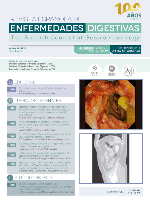
REVISTA ESPANOLA DE ENFERMEDADES DIGESTIVAS
Fostering collaboration in the field of digestive health.REVISTA ESPANOLA DE ENFERMEDADES DIGESTIVAS, a pivotal Open Access journal published by ARAN EDICIONES, S A, has been at the forefront of advancing the field of gastroenterology since its inception in 1990. With a robust commitment to disseminating high-quality research, the journal provides a platform for researchers, clinicians, and students to share innovative findings and insights concerning digestive diseases. The journal is characterized by its Q3 ranking in both Gastroenterology and Miscellaneous Medicine categories, indicative of its significant contributions to these fields, and is positioned within the 36th percentile of Scopus rankings for medicine related to gastroenterology. Based in Spain, REVISTA ESPANOLA DE ENFERMEDADES DIGESTIVAS has embraced the Open Access model since 2004, ensuring that its articles are readily available to a global audience without financial barriers. The journal not only supports academic discourse but also plays a crucial role in improving clinical practices and health outcomes related to digestive health.
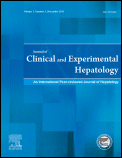
Journal of Clinical and Experimental Hepatology
Unveiling the latest in liver research and treatment.The Journal of Clinical and Experimental Hepatology, published by Elsevier - Division Reed Elsevier India Pvt Ltd, is a premier platform dedicated to advancing the field of hepatology. With an ISSN of 0973-6883 and an E-ISSN of 2213-3453, this journal has gained recognition for its impactful contributions to both clinical practice and scientific research in the domain of liver health. Ranking in the Q2 quartile for Hepatology in 2023 and positioned at 33rd out of 82 in Scopus’s Hepatology category, it reflects a robust impact factor and a commitment to publishing high-quality, peer-reviewed articles. Researchers, clinicians, and students can engage with a wealth of open-access content covering the latest advancements, challenges, and insights in hepatology, as the journal aims to disseminate knowledge from 2011 through 2025. Join the community of experts as we explore critical developments in the understanding and treatment of liver diseases.

Korean Journal of Gastroenterology
Fostering Global Dialogue on Digestive HealthKorean Journal of Gastroenterology (ISSN: 1598-9992, E-ISSN: 2233-6869), published by the Korean Society of Gastroenterology, has been a premier outlet for research and advancements in the field of gastroenterology since its inception in 1968. This open-access journal, based in South Korea, fosters a global dialogue on gastrointestinal health, embracing contributions from a diverse array of disciplines within medicine. It is currently ranked in the Q4 quartile for miscellaneous medicine and holds a Scopus rank of #323 out of 636 in general medicine, reflecting its commitment to publishing impactful research despite its relatively recent establishment in high-impact metrics. With a continuous publication timeline extending through to 2024, the journal aims to enhance understanding of gastrointestinal disorders and promote innovative treatments, making it an essential resource for researchers, clinicians, and students alike who seek to stay abreast of the latest developments and clinical applications in gastroenterology.
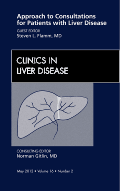
Clinics in Liver Disease
Exploring the frontiers of liver disease management.Clinics in Liver Disease is an esteemed peer-reviewed journal published by W B Saunders Co-Elsevier Inc, dedicated to advancing the field of hepatology. Established in 1997 and covering a broad range of topics within liver disease research, this journal serves as a vital resource for researchers, clinicians, and students engaged in the study of liver health and diseases. With a commendable impact factor placing it within the Q2 category in Hepatology and ranking #32 out of 82 in the Scopus classifications, it consistently disseminates high-quality research and clinical insights. The journal’s commitment to promoting understanding and management of liver diseases is reflected in its rigorous editorial standards and comprehensive review processes. Although not an open-access publication, Clinics in Liver Disease offers subscription options that ensure accessibility to up-to-date research and reviews critical for both academic and clinical success.

Hepatobiliary & Pancreatic Diseases International
Connecting clinicians and researchers in the fight against liver and pancreatic disorders.Hepatobiliary & Pancreatic Diseases International, an esteemed journal published by Elsevier, stands as a vital resource within the field of gastroenterology and hepatology. Established in 2002, this journal has developed a significant reputation, currently ranked in the second quartile (Q2) in both categories as of 2023, showcasing its commitment to high-quality research and clinical studies. Based in Singapore, Hepatobiliary & Pancreatic Diseases International serves as an essential platform for researchers, clinicians, and healthcare professionals to share innovative findings, therapeutic approaches, and advancements in the understanding of hepatobiliary and pancreatic diseases. Although the journal does not currently offer Open Access, its rigorous peer-review process ensures that published articles maintain the highest scientific standards, fostering knowledge dissemination among the global research community. With a convergence period extending to 2024, this journal continues to play a pivotal role in enhancing the understanding and treatment of complex gastrointestinal conditions, making it a must-read for anyone engaged in this dynamic field.

Gut and Liver
Pioneering research for a healthier tomorrow.Gut and Liver is a prestigious peer-reviewed journal dedicated to advancing the fields of Gastroenterology and Hepatology. Published by the EDITORIAL OFFICE GUT & LIVER in South Korea, this Open Access journal has been disseminating valuable research findings since 2007, making critical knowledge accessible to a global audience. With an impressive 2023 impact factor that places it in Q1 rank in both Gastroenterology (#28/167) and Hepatology (#22/82), it is recognized as a leader in the medical domain. The journal covers diverse topics, including innovative therapeutic strategies, clinical practices, and groundbreaking research in liver diseases and gastrointestinal disorders, thereby playing a vital role in improving patient care and outcomes. Researchers, healthcare professionals, and students can benefit from the journal's wealth of information, designed to foster collaboration and spark new ideas within the scientific community. For further engagement with current research, readers can access issues from 2009 to 2024 and stay updated on the latest advancements in the field.
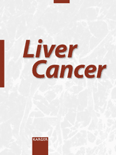
Liver Cancer
Transforming understanding of liver neoplasms globally.Liver Cancer is a premier, peer-reviewed journal dedicated to the comprehensive study and advancement of knowledge surrounding liver neoplasms. Published by KARGER and headquartered in Switzerland, this journal has been an open-access platform since 2012, providing researchers with invaluable insights into the rapidly evolving field of hepatology and oncology. With an impressive impact factor that places it in the Q1 category for both Hepatology and Oncology in 2023, Liver Cancer stands out as a high-impact conduit for groundbreaking research, ranking #19 out of 404 in Medicine _ Oncology and #6 out of 82 in Medicine _ Hepatology according to Scopus. Researchers, practitioners, and students are encouraged to engage with the journal's content, which encompasses clinical studies, basic research, and reviews that contribute significantly to understanding liver cancer dynamics, diagnosis, and treatment strategies. This journal not only facilitates the dissemination of knowledge but also fosters collaboration in a well-established and impactful global scientific community.

JHEP Reports
Advancing healthcare knowledge through open access.JHEP Reports, published by ELSEVIER, stands at the forefront of scholarly communication in the fields of Gastroenterology, Hepatology, Immunology and Allergy, and Internal Medicine. As an Open Access journal since 2019, it provides a platform for the dissemination of high-quality research findings, making vital information readily accessible to a global audience. With a commendable impact characterized by a Q1 category ranking across four medical disciplines in 2023, JHEP Reports demonstrates its significance and influence, reflected in its impressive Scopus ranks—#11 in Gastroenterology and #14 in Internal Medicine, amongst others. This esteemed journal not only plays a critical role in advancing knowledge but also fosters collaboration among researchers, practitioners, and students keen on exploring innovations and breakthroughs in health sciences. At RADARWEG 29, 1043 NX AMSTERDAM, NETHERLANDS, JHEP Reports is committed to bridging the gap between research and application, ushering in a new era of informed and effective healthcare solutions.
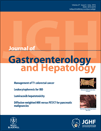
JOURNAL OF GASTROENTEROLOGY AND HEPATOLOGY
Uncovering the latest in digestive health advancements.Welcome to the JOURNAL OF GASTROENTEROLOGY AND HEPATOLOGY, an esteemed publication in the field of gastroenterology and hepatology, proudly published by WILEY. Established in 1986, this journal serves as a crucial platform for researchers, healthcare professionals, and students, presenting groundbreaking research and comprehensive reviews that drive advances in understanding and treating gastrointestinal and liver diseases. With a strong reputation evidenced by its Q1 ranking in gastroenterology and Q2 ranking in hepatology, this journal ranks impressively in the Scopus metrics - positioned at #22 out of 167 in gastroenterology and #21 out of 82 in hepatology, reflecting its contribution to scholarly excellence. Although it does not offer open access options, the journal’s rich archive and diverse topics make it indispensable for those dedicated to improving patient outcomes in these critical areas of medicine. Whether you are a seasoned researcher or an aspiring medical professional, engaging with this journal will keep you at the forefront of the latest developments and emerging trends in gastroenterology and hepatology research.